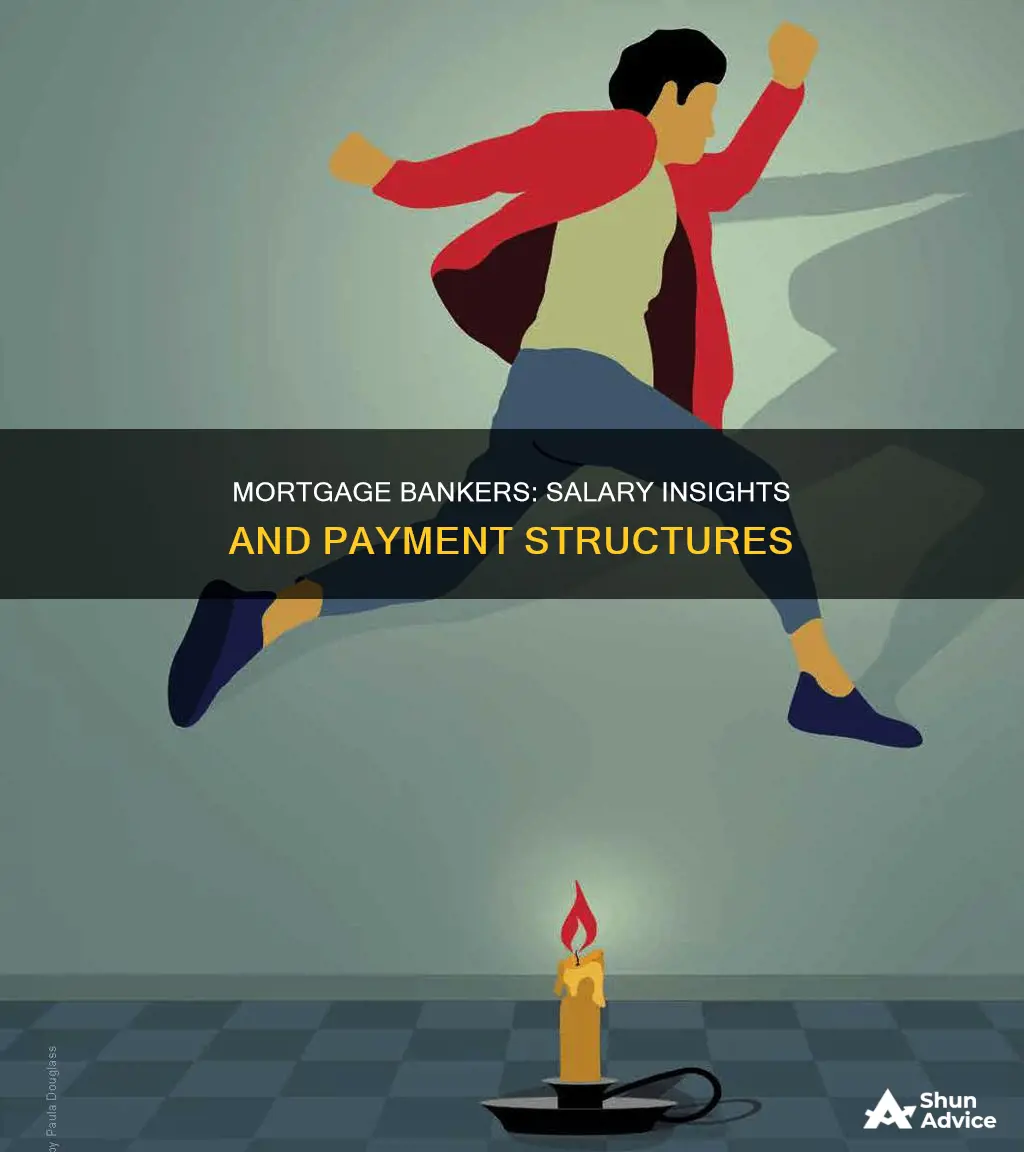
Mortgage bankers are individuals or institutions that originate mortgages. They are paid by the institution they work for, which is typically a salary, although some institutions offer performance-based bonuses. Mortgage bankers work with borrowers to choose a mortgage product, review applications, and approve or deny loan requests. They are an important part of the homebuying process and can make a significant difference in whether a loan application is approved or rejected. Mortgage bankers can also make money through origination fees, yield spread premiums, closing costs, and other methods.
| Characteristics | Values |
|---|---|
| Salary | Mortgage bankers are usually paid a salary by the institution they work for. |
| Performance-based bonuses | Institutions sometimes offer performance-based bonuses. |
| Commission | Mortgage bankers can also be paid on commission, which is based on the dollar amount of the loan. |
| Origination fees | Mortgage bankers can be paid from origination fees, which are typically 0.5% to 1% of the loan value. |
| Yield spread premiums | The difference between the interest rate charged to the homeowner and the rate the lender pays is the yield spread premium. |
| Discount points | Paying points upfront lowers the monthly loan payments. |
| Closing costs | Mortgage bankers can make money from closing costs, which include application, processing, underwriting, and loan lock fees. |
| Mortgage-backed securities | Mortgage-backed securities allow lenders to profit by packaging and selling loans. |
| Loan servicing | If MBS purchasers cannot handle administrative tasks, lenders may perform these tasks for a small percentage of the mortgage value or a predetermined fee. |
What You'll Learn
- Mortgage bankers are paid a salary by their institution
- They may also receive performance-based bonuses
- Mortgage loan officers are paid via origination fees or the mortgage cost
- Officers can be paid via salary, commission, or a combination of both
- Lenders can make money from closing costs, origination fees, and more

Mortgage bankers are paid a salary by their institution
Mortgage bankers are sometimes paid a performance-based bonus on top of their salary. They can also make money from origination fees, yield spread premiums, discount points, closing costs, mortgage-backed securities, and loan servicing.
Mortgage loan officers, on the other hand, may be paid in a variety of ways, including commission, a combination of salary and commission, or a salary. Their pay is usually incentivized by how successful they are at closing home mortgage loans. If a loan doesn't close, they don't get paid. Mortgage loan officers can be paid by the lender or by the buyer in the form of a loan origination fee or broker fee.
Mortgage lenders can also make money in a variety of ways, including origination fees, yield spread premiums, discount points, closing costs, mortgage-backed securities, and loan servicing. They typically charge an origination fee of 0.5% to 1% of the loan value, which is due with mortgage payments.
Mortgage Ratings: Understanding the EMortgage Rating System
You may want to see also

They may also receive performance-based bonuses
Mortgage bankers can often receive performance-based bonuses, which are typically tied to specific goals and metrics. These bonuses are designed to incentivize mortgage bankers to perform at a high level and meet key performance indicators set by their financial institution. The structure of these bonuses can vary, but they often serve as a significant component of a mortgage banker's overall compensation package.
Performance-based bonuses for mortgage bankers might be structured in several ways. One common approach is for the financial institution to set volume-based targets. For example, a mortgage banker might be incentivized to originate a certain number of loans within a specified time frame, with bonuses increasing at various tiers of volume. This strategy encourages mortgage bankers to actively seek out new business and maintain a high level of productivity.
Another aspect of performance-based bonuses could be the quality of the loans originated. Financial institutions often emphasize the importance of responsible lending practices and customer satisfaction. Therefore, mortgage bankers may receive bonuses for maintaining low delinquency rates on the loans they originate, achieving high customer satisfaction scores, or receiving positive feedback through customer surveys. This component of the bonus structure encourages mortgage bankers to prioritize the long-term success of the loans they facilitate, not just the volume.
Additionally, mortgage bankers may be incentivized through bonuses to cross-sell other financial products offered by the institution. For example, they might be rewarded for successfully referring customers to other departments for products such as credit cards, investment services, or insurance. This aspect of the bonus structure recognizes the role of mortgage bankers as relationship managers who can deepen the bank's relationship with its customers.
The specific metrics and targets for performance-based bonuses will vary from one financial institution to another. They are often tailored to align with the institution's overall business strategy and goals. These bonuses are typically paid out on a quarterly or annual basis, depending on the structure set by the financial institution, and can significantly impact the total compensation earned by mortgage bankers.
It is important to note that while performance-based bonuses can motivate mortgage bankers to excel in their roles, they must also adhere to ethical standards and regulatory guidelines. Financial institutions must carefully design bonus structures to avoid incentivizing behaviors that could lead to irresponsible lending practices or customer dissatisfaction. Balancing the incentives for volume, quality, and customer satisfaction is crucial in maintaining the integrity of the mortgage banking profession.
Zillow's Mortgage Estimates: Accurate or Misleading?
You may want to see also

Mortgage loan officers are paid via origination fees or the mortgage cost
Mortgage loan officers are typically paid via a combination of salary and commission. The commission is incentivized by the number of mortgages they originate in a year. They are usually paid a loan-specific fee or commission, which is paid by the homebuyer or the lender. Mortgage loan officers can be paid from the origination fees on the front end or from the cost of the mortgage itself on the backend. Origination fees are typically 0.5% to 1% of the loan value, which is due with mortgage payments. This fee increases the overall interest rate paid, also known as the annual percentage rate (APR). The APR is the mortgage interest rate plus other charges. For example, a $200,000 loan with a 6% interest rate over 30 years has a 1% origination fee, resulting in a $2,000 homebuyer origination fee.
Loan officers can also be paid a fixed amount per loan, a fixed percentage of the loan amount, or a combination of both. When paid per loan, lenders can set minimums or maximums paid per loan. This flexibility allows lenders to set up different pay arrangements to serve a range of borrowers and loan types. Mortgage loan officers who are paid on commission only are usually those who work for independent mortgage companies, while those who work for local banks and credit unions are paid a small commission on top of their salary or base pay.
Trulia Mortgage Estimates: How Reliable Are They?
You may want to see also

Officers can be paid via salary, commission, or a combination of both
Mortgage loan officers are an integral part of the home-buying process, and their compensation can vary. Officers can be paid via salary, commission, or a combination of both.
Some mortgage loan officers are paid a salary by the institution they work for. This means their pay is not directly linked to the number of loans they originate, and they may receive performance-based bonuses. This is a more stable form of income, and these officers are often employed by a specific lender.
Other loan officers are paid via commission, which is a percentage of the loan amount or a fixed amount per loan. This can be paid by the lender or the borrower, and the officer's income is directly tied to their performance. If the deal doesn't close, they don't get paid. Commission-based officers often work for multiple lenders and have a higher earning potential, with incomes exceeding $200,000.
Some loan officers are paid a combination of salary and commission. This provides the stability of a base salary with the opportunity to earn more through commissions. This model is common at small banks and credit unions, especially in lower-cost areas.
The method of compensation can impact the motivation and performance of loan officers. Those paid solely on commission may be more motivated to close deals, while those on a salary may have different priorities. It is important for homebuyers to understand how loan officers are compensated and to carefully review all fees and costs associated with the mortgage process.
Understanding Mortgage-Backed Securities: Pricing and Risks
You may want to see also

Lenders can make money from closing costs, origination fees, and more
Mortgage lenders can make money in several ways, including origination fees, closing costs, and mortgage-backed securities (MBS).
Origination fees are charged by the lender for setting up the mortgage and typically amount to 0.5% to 1% of the loan value. These fees are due with mortgage payments and increase the overall interest rate (or annual percentage rate, APR) on the mortgage, effectively increasing the total cost of the home. For example, a $200,000 loan with a 6% interest rate over 30 years has a 1% origination fee, which equates to a $2,000 fee for the homebuyer.
Closing costs are fees associated with the process of creating a loan and include application, processing, underwriting, and loan lock fees, among others. These fees can vary by lender and are typically explained upfront in a good faith estimate (GFE). Closing costs usually amount to 3%–6% of the loan amount, so for a $200,000 mortgage, one can expect to pay $6,000–$12,000 in closing costs. Pest inspections, home appraisals, recording fees, and land surveys are also included in closing costs.
Lenders can also make money by packaging and selling loans through mortgage-backed securities (MBS). They may continue to earn revenue by servicing the loans in the MBS they sell. If the MBS purchasers are unable to handle the administrative tasks involved in loan servicing, lenders may perform these tasks for a small percentage of the mortgage value or a predetermined fee.
Cars as Mortgage Assets: Evaluating Vehicle Collateral
You may want to see also
Frequently asked questions
Mortgage bankers are usually paid a salary by the institution they work for. This can be incentivised by performance, with bonuses or commission being offered on top of a base salary.
The average salary for a loan officer is $79,825 per year, but this can vary depending on location and experience. Top earners can make over $200,000 per year.
Mortgage bankers can be paid a commission based on the dollar amount of the loan. This is usually a small percentage of the loan amount, ranging from 0.5% to 3%.
Mortgage bankers work for specific institutions, so if a loan is not taken out, they are still paid a salary by that institution.
Mortgage bankers can be paid from origination fees, which are typically 0.5% to 1% of the loan value. They can also make money from closing costs, yield spread premiums, discount points, and mortgage-backed securities.







